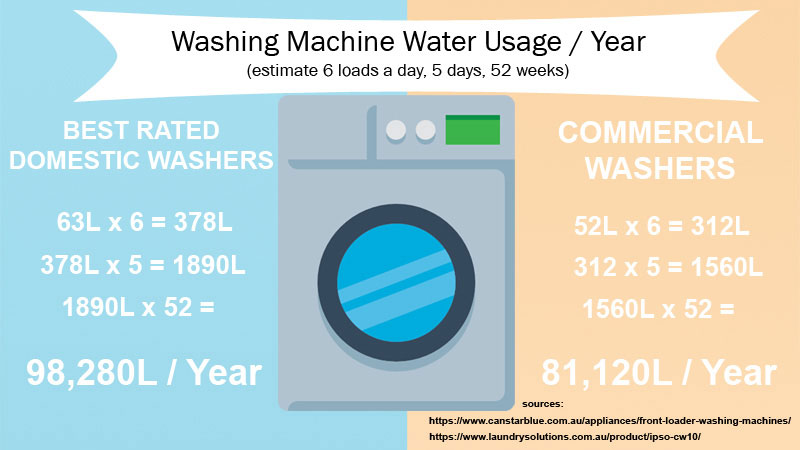Commercial vs Domestic washing machine, which is better and why?
Firstly,
Unlike domestic washing machines, commercial machines are made to handle much higher laundry demands where usage is up to all day, every day. Commercial machines are also designed to be easily serviced instead of frequently replaced.
They also use much more heavy-duty parts. These are some of the parts that are “beefed up” to create a much more heavy-duty washing machine.
- Cabinet
- Frame
- Motor
- Gearbox
- Transmission
- Clutch
- Brake
- Bearings and Bearing Housings
- Pump
- Suspension
In a nut-shell, commercial washing machines and commercial laundry equipment are designed with reliability and longevity in mind when compared to domestic machines.
Warranty
As you can imagine, commercial washing machines have solid warranty periods. Yet, there is one thing that many potential purchasers overlook.
The fact is the warranties of domestic machines are quite often void or reduced if used in commercial applications.
For instance, if a motel purchased a domestic machine to wash the sheets of their motel rooms and had an issue with their machine, it may not be covered under warranty as the motel is deemed to be a commercial application.
Most customers are unaware that this is the case with domestic machines and have been left high and dry with near new machines with no warranty.
Type – Front Load or Top Load?
So, which type of commercial washing machine is best, top load or front load? Well this comes down to a couple of things including
- The application,
- Whether water usage is an issue
- Personal preference.
Most new businesses will choose to go with front load machines as they are more water efficient in comparison to top load washing machines.
For example, our top load machine uses about 100 litres of water per cycle compared to the 42 litres of a commercial front load washing machine.
This is a very important factor to consider for aged care facilities as they are very big consumers of water and any reduction they can get is a bonus.
Not only do all commercial businesses have to pay for the water used in their shop, they also often have to pay approximately 80% -90% of the cost of the water used in trade waste charges here in Australia.
For instance, if they use $100 of water they would also be charged about $80 – $90 in waste charges as well.
Because of its action the front loader is recognised as supplying a greater wash quality compared to the top load model. Front load washers also have a much higher extraction speed, with our CW10 washer extracting at a speed of 1200 RPM whereas our CTL7 top loader extracts at 710 RPM.
The higher extraction speed translates to a much-reduced time in the dryer as more moisture has been extracted during the spin cycle on the front loader.
One of the defining features of a top loader that people prefer opposed to the front loader is the ability to keep adding linen after the wash cycle has started. This is not possible once the door locks on a front loader.
The other determining factor to why people will choose one over the other is price. Based on our current models and pricing our top load washer is about $1000 cheaper than the front load machine. On this alone many customers will choose the top load machine, which is understandable!
With the above said, the sales of top load machines are stronger than ever due to both their simplicity, longevity and price.
Some people love their top loaders and others their front loaders. All-in-all it comes down to personal preference.
Which machine do I need?
So, who actually uses commercial washing machines? When it comes down to it, the businesses who need a reliable washer to do several loads per day.
- Aged Care Facilities
- Hotels
- Motels
- Child Care Centres
- Back Packers
- Day Spas
- Hair Dressers
- Government Departments
- Cleaning Companies
- Vets
- Massage Therapists
- Health Care Professionals
- Serviced Apartments
- Caravan Parks
- Restaurants
- Universities
- Schools
As you can see the list is quite extensive! One last great thing about deciding between a commercial vs domestic washing machine is that commercial are also available in coin and non-coin options to service both the user-pays market as well as the OPL (on premise laundry) market.
We hope this article has helped you in your decision process. If you need any help with deciding on the best commercial washer for your business then call us on 1300 666 289.
Additionally, you can fill out our contact form and we will be in touch.

